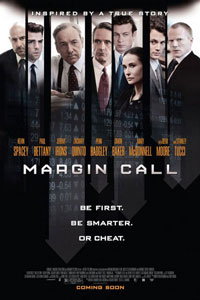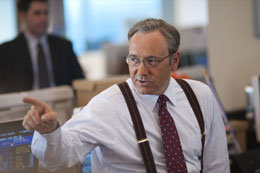With the Occupy Wall Street movement bringing the issues surrounding the financial system to the forefront of our national discourse, debut writer/director J.C. Chandor’s Margin Call pulls off the easily attached labels of investment bankers and attempts to humanize the first shots fired in the global financial crisis of 2008.
 While it may be hard to believe that a good natured entry-level risk manager (Zachary Quinto) manages to be the first to scare the chain of command in a Lehman Brothers-inspired investment firm enough to take desperate action and become ground zero of a meltdown, Chandor’s casual office dialogue and a powerful performance from Kevin Spacey allows Margin Call to the answer the question “What the hell were they thinking?”
While it may be hard to believe that a good natured entry-level risk manager (Zachary Quinto) manages to be the first to scare the chain of command in a Lehman Brothers-inspired investment firm enough to take desperate action and become ground zero of a meltdown, Chandor’s casual office dialogue and a powerful performance from Kevin Spacey allows Margin Call to the answer the question “What the hell were they thinking?”
The movie’s characters, having just survived a massive layoff are immediately thrust into crisis.
The moral implications of unloading worthless complex financial instruments upon an unsuspecting market are discussed, but Chandor allows each character to wrestle with the ethical questions raised in their own way. Enticed by seven-figure bonuses, each one slowly and consciously falls in line with upper management.
 Spacey’s character seems to hold out the longest, but hope is lost as he still middle-manages his path into moral ambiguity. He gives the speech of the film to the front line traders before the markets open and the fire sale begins.
Spacey’s character seems to hold out the longest, but hope is lost as he still middle-manages his path into moral ambiguity. He gives the speech of the film to the front line traders before the markets open and the fire sale begins.
Much of the film is shot from a high-rise office building in Manhattan, and as the ramifications of the firms malfeasance are revealed, the feeling of vertigo the viewer gets makes jumping out the window seem like the best option at times.
The CEO provides the demonic foil that any great morality play cries out for, cynically played by Jeremy Irons, but the film still challenges us to ask ourselves what we would do if presented with the same situation, without becoming needlessly preachy.
We already know the answer, and we all have our price.




Comments on this entry are closed.